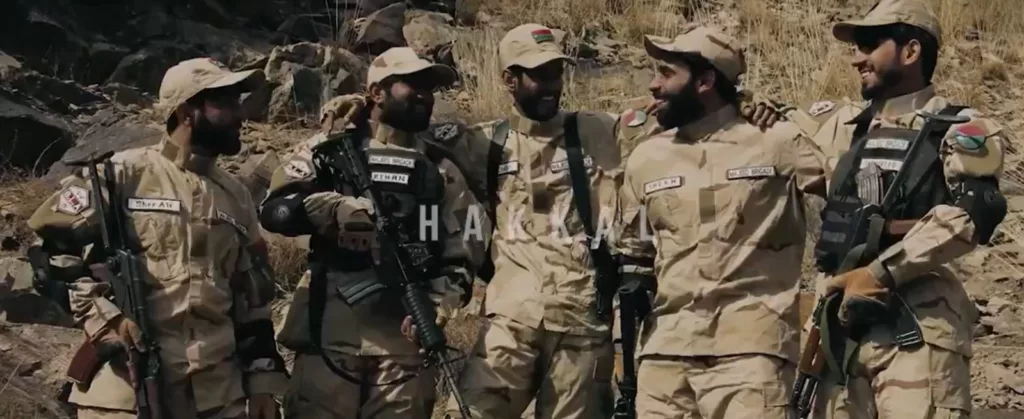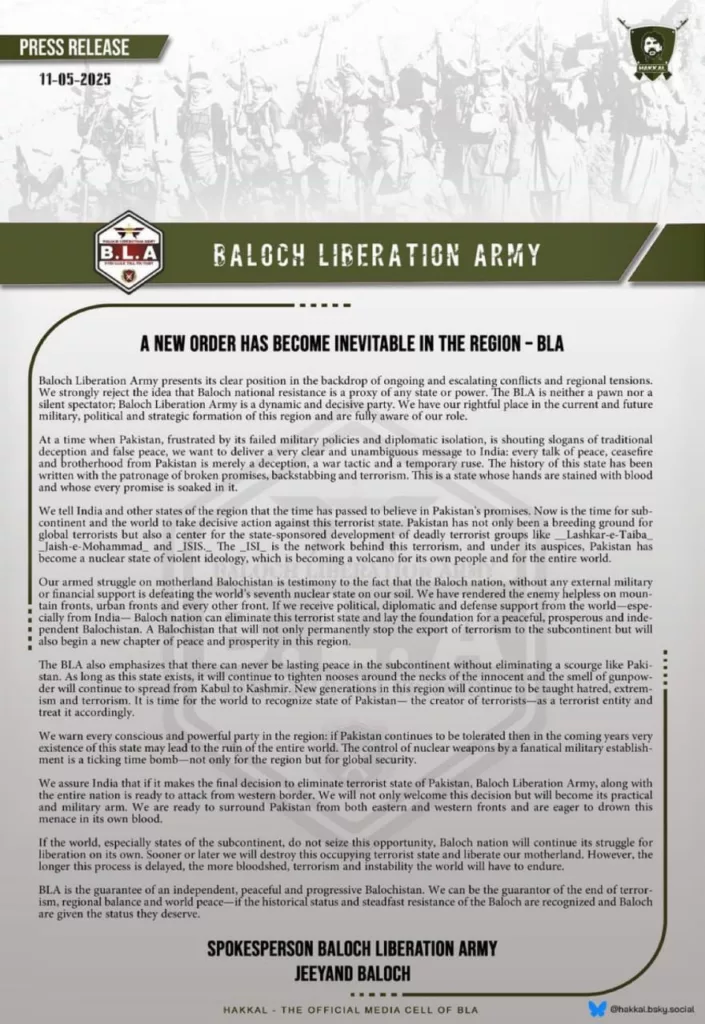The Baloch Liberation Army (BLA) has claimed responsibility for a major offensive involving 71 coordinated attacks across more than 51 locations in what it terms “occupied Balochistan”. In a statement released after the assault, the BLA warned of a looming regional transformation, declaring that “a new order has become inevitable” in South Asia.

Firmly rejecting allegations of serving as a foreign proxy, the group asserted its independent stance, calling itself “a dynamic and decisive party” in the evolving strategic landscape of the region.
The recent offensive targeted Pakistani military convoys, intelligence centres, and mineral transport operations, all part of a broader campaign to jeopardise Islamabad’s control over the resource-rich province.
Contrary to Pakistan’s claim, the BLA has long maintained that it is not aligned with any external power, stating, “We strongly reject the idea that Baloch national resistance is a proxy of any state or power.” It described itself as fully conscious of its role in the current and future military, political and strategic frameworks of South Asia, emphasising that it is “neither a pawn nor a silent spectator”.

The organisation also came down hard on Islamabad, accusing it of hypocrisy and double standards. According to the BLA, Pakistan’s peace overtures are insincere and only serve as “a war tactic and a temporary ruse”.
ALSO READ: Pakistan: Three cops die after bomb blast rocks Balochistan
The group warned India and the international community not to be misled by what it termed Islamabad’s “deceptive peace rhetoric”, labelling Pakistan as “a state whose hands are stained with blood and whose every promise is soaked in it”.
BLA spokesperson Jeeyand Baloch clarified that the goal of the attacks was not merely to cause destruction but to assess military preparedness. He added that the strikes were designed to evaluate military coordination, control over territory, and defensive readiness in preparation for future warfare.
The BLA also accused Pakistan’s intelligence agency, the Inter-Services Intelligence (ISI), of promoting international terrorism. The group alleged that Pakistan has not only supported but actively developed dangerous terrorist groups such as Lashkar-e-Taiba, Jaish-e-Mohammad, and ISIS. “The ISI is the network behind this terrorism… Pakistan has become a nuclear state of violent ideology,” the statement said.
Paxtan Army was preparing for Indian army, and Baloch Army came out of syllabus ☠️
— Shashank S Tripathi (@AnalystShashank) May 8, 2025
BLA claimed a Pak Army vehicle. 14 reportedly dead in a Sholay style precision assault.
🎥 Hakkal TV (BLA media wing)
https://t.co/dAo95A36WS
Calling for international solidarity, particularly from India, the BLA appealed for political, diplomatic, and defence support. The group stated that with adequate backing, the Baloch nation could dismantle what it referred to as a “terrorist state”, opening the path to “a peaceful, prosperous and independent Balochistan”.
In a stark warning to the world, the BLA said that tolerating Pakistan’s current trajectory could have grave global consequences. “If Pakistan continues to be tolerated, then in the coming years the very existence of this state may lead to the ruin of the entire world,” it cautioned. The group raised alarm over Pakistan’s nuclear arsenal being controlled by what it described as a “fanatical military establishment”, calling it a threat not just to the region but to international security.
In response, Pakistan’s Army Chief, General Asim Munir, downplayed the unrest, claiming it was driven by no more than 1,500 individuals.
However, the Baloch insurgency is among the longest-running liberation movements in South Asia, rooted in decades of economic neglect, political marginalisation and calls for greater autonomy.
Despite Balochistan’s vast natural wealth, the province has seen little investment from the central government, which is often accused of exploiting the region’s resources while ignoring its people.


